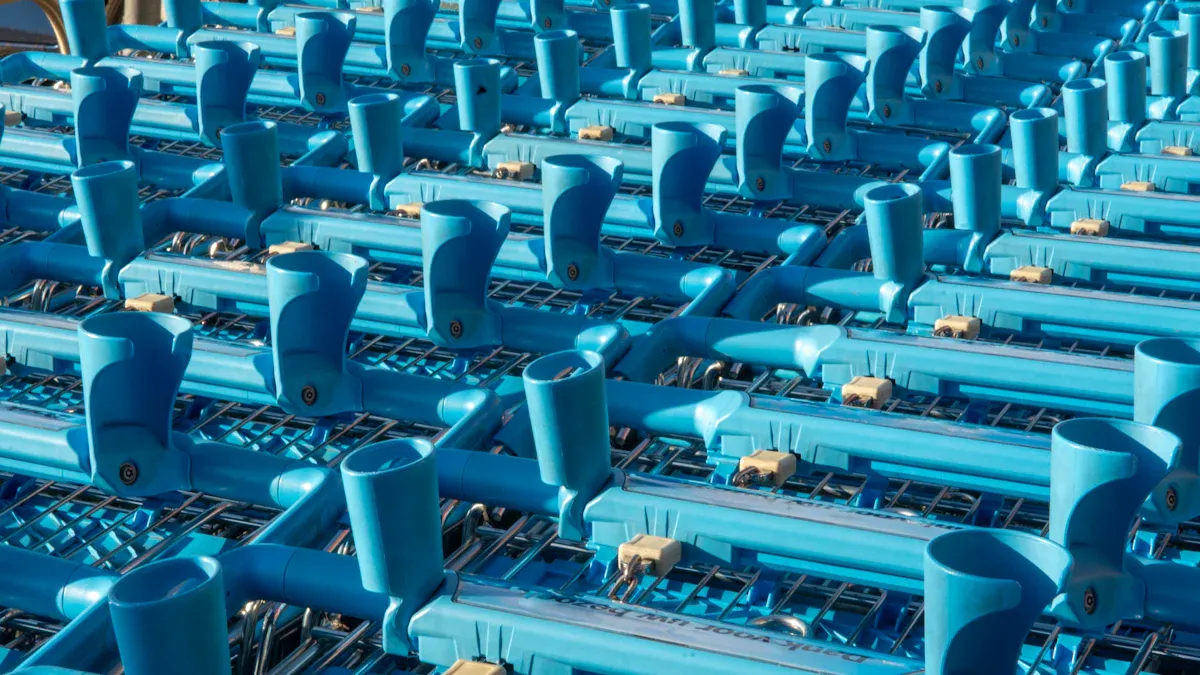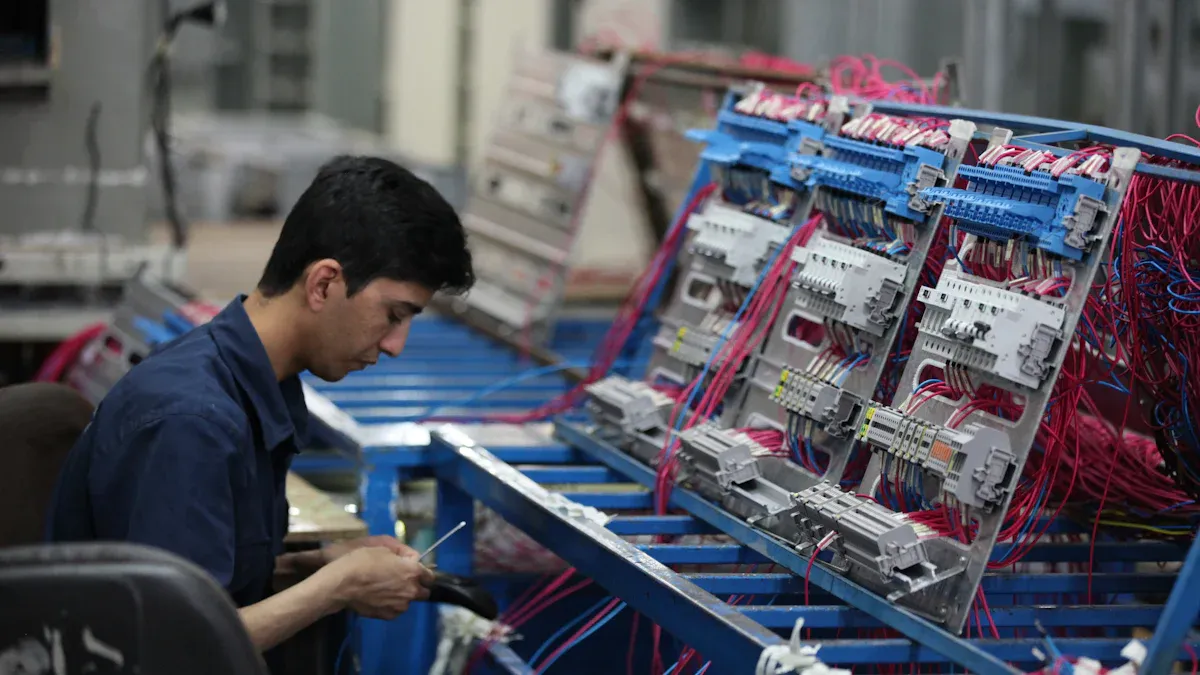American Shopping Cart Manufacturers

Unarco Industries, Americana Companies, National Cart Co., R.W. Rogers Company, and Versacart Systems stand out as top shopping cart manufacturers in the United States. These american shopping cart manufacturers lead the market with strong supply chains, advanced shopping cart technology, and a focus on sustainability. Unarco supplies Walmart, while National Cart Co. has expanded in the eastern U.S., showing growth. Metal carts, known for durability and cost-effectiveness, make up 55% of the market share.
Region | Market Size 2024 (USD million) | Market Size 2033 (USD million) |
|---|---|---|
North America | 798 | 1,444 |
American shopping cart manufacturers invest in antimicrobial coatings, smart carts, and sustainable materials to meet the changing needs of retailers.
Key Takeaways
Top American shopping cart manufacturers lead with quality, innovation, and sustainability to meet retailer needs.
Metal, plastic, hybrid, and smart carts offer different benefits; retailers should choose based on store size and customer preferences.
Smart carts use advanced technology to improve shopping but come with higher costs and maintenance needs.
Customization options like ergonomic handles and branded logos help stores create unique shopping experiences.
Retailers should compare manufacturers carefully, considering cost, maintenance, and support to find the best fit.
American Shopping Cart Manufacturers List

Unarco Industries
Unarco Industries stands as a leader in the shopping cart industry. The company focuses on research and development to create durable carts for many retail settings. Unarco uses high-quality materials and ergonomic designs to improve customer comfort. Retailers can choose from a range of customization options, allowing them to match carts to their brand and store needs. Unarco’s commitment to innovation helps them stay ahead in a competitive market.
Technibilt
Technibilt produces about one million carts each year, showing its large-scale manufacturing power. The company uses a patented Tech-Seal protective coating that adds several layers of corrosion resistance, including zinc phosphate, cathodic primer, polyester, and Teflon. This coating extends the life of each cart and supports environmental goals. Technibilt’s Sof-Runner wheel system improves stability and durability, making carts last up to five times longer than standard models. The Renaissance model features a one-piece basket made from FDA-approved resin, with options for logos, cup holders, and dividers.
Americana Companies
Americana Companies has a long history of innovation. The company moved from all-wire chrome-plated carts to plastic carts with powder-coated metal parts. This change offers better rust protection and longer warranties, sometimes up to five years. Americana also provides a trade-out program for old carts and sends mobile maintenance teams to stores for free warranty checks and repairs. These services help retailers keep their carts in top condition.
National Cart Company
National Cart Company supplies carts to many large retailers across the United States. The company focuses on quality and reliability. National Cart offers a wide range of products, including metal and plastic carts, to fit different store needs. Their carts are known for strong construction and easy maneuverability. National Cart also invests in new technology to improve both safety and customer experience.
Peggs Company
Peggs Company specializes in carts for both retail and industrial use. The company designs carts that handle heavy loads and frequent use. Peggs uses strong materials and advanced manufacturing methods to ensure each cart lasts a long time. Their product line includes specialty carts for unique retail needs, such as insulated compartments and detachable bags.
RW Rogers Company
RW Rogers Company offers a variety of shopping carts and store fixtures. The company focuses on flexibility and customization. RW Rogers provides carts with features like ergonomic handles and branding options. Their carts meet the needs of many types of retailers, from grocery stores to specialty shops. RW Rogers also pays attention to new trends, such as sustainability and smart technology.
Premier Carts
Premier Carts supplies both new and refurbished shopping carts. The company serves small businesses and large chains alike. Premier Carts offers metal, plastic, and hybrid carts to fit different budgets and store layouts. Their team helps retailers choose the right carts for their needs and provides support after the sale.
Versacart
Versacart is known for its innovative cart designs. The company creates carts with features like detachable bags and specialized wheels for different surfaces. Versacart focuses on making carts that are easy to use and adapt to many retail environments. Their products help stores improve customer satisfaction and efficiency.
Tip: Retailers looking for more options or detailed specifications can explore resources such as Thomasnet, RedSheep, and ShopFittingManufacturer. These platforms provide directories and reviews of american shopping cart manufacturers, helping buyers compare features, prices, and services.
Key innovation metrics set these manufacturers apart:
Durability and material quality remain essential.
Customization, such as ergonomic handles and branding, is now common.
Advanced technology, including AI and mobile payment, is becoming standard.
Adaptability for different retail needs, like insulated compartments or specialized wheels, improves usability.
The focus has shifted from just physical strength to technology-driven solutions and better customer experiences.
What Sets Manufacturers Apart
Innovation
Innovation drives the shopping cart industry forward. Manufacturers invest in research and development to create new features and improve existing designs. Companies introduce smart carts with digital displays, mobile payment options, and advanced wheel systems. These upgrades help stores offer better customer experiences and improve efficiency. R&D investment often leads to stronger green innovation performance, showing that innovation and sustainability can work together. Retailers look for manufacturers who bring fresh ideas to the market and adapt quickly to changing needs.
Quality
Quality remains a top priority for American shopping cart manufacturers. They use strong materials, such as high-grade steel and durable plastics, to ensure carts last through heavy use. Many companies test their carts for stability, safety, and ease of movement. Features like corrosion-resistant coatings and reinforced frames add to the carts’ lifespan. Retailers value carts that require less maintenance and stand up to daily wear and tear. High-quality carts help stores save money over time and keep customers safe.
Sustainability
Sustainability has become a key factor in choosing a manufacturer. Companies now use recycled materials, energy-efficient production methods, and eco-friendly coatings. The table below shows how some leading brands integrate sustainability into their operations:
Manufacturer | Sustainability Integration Score (%) | Notes on Innovation and Quality |
|---|---|---|
Patagonia | 77 | Strong stakeholder engagement and green innovation performance |
Unilever | 72 | Economic pressures affect sustainability efforts |
Ikea | 60 | Operational constraints limit sustainability embodiment |
Patagonia leads with a 77% sustainability integration score, reflecting strong engagement and a commitment to green innovation. Unilever and Ikea also show progress, but economic and operational challenges can limit their efforts. These scores highlight the balance manufacturers must strike between sustainability and business goals.
Customization
Customization allows retailers to match carts to their brand and store needs. Manufacturers offer options such as ergonomic handles, branded logos, cup holders, and special compartments. Some companies design carts for specific uses, like insulated baskets or detachable bags. Customization helps stores stand out and meet unique customer needs.
🛒 Retailers who choose manufacturers with strong customization options can create a shopping experience that feels unique and tailored to their customers.
Shopping Cart Manufacturers: Products

Metal Carts
Metal carts remain a staple in many retail stores. Most shopping cart manufacturers use steel for its strength and durability. These carts can handle heavy loads and frequent use. Many stores choose metal carts because they last a long time and resist damage. The Consumer Shopping Cart Market Outlook report shows that steel carts still hold a large share of the market. Retailers value their reliability, especially in high-traffic environments.
Plastic Carts
Plastic carts have gained popularity in recent years. They weigh less than metal carts and often come in bright colors. Many shopping cart manufacturers offer plastic carts with smooth surfaces that are easy to clean. The Data Bridge Market Research report notes that plastic carts are growing in demand due to their maneuverability and sustainability. Retailers like these carts because they do not rust and can be recycled at the end of their life.
Hybrid Carts
Hybrid carts combine the best features of metal and plastic. Manufacturers design these carts with metal frames and plastic baskets. This mix creates a cart that is both strong and lightweight. The market has seen rising demand for hybrid carts, driven by ergonomic design and sustainability. Retailers often choose hybrid carts to improve customer comfort and reduce maintenance costs. Many stores also appreciate their modern look.
Smart Carts
Smart carts represent the latest innovation from shopping cart manufacturers. These carts include technology such as digital displays, RFID tags, and mobile payment systems. The Consumer Shopping Cart Market Outlook highlights smart carts as a key growth driver in the industry. Retailers use smart carts to offer features like automated inventory management and real-time analytics. Some stores face challenges with high production and maintenance costs, but the benefits often outweigh these concerns. Smart carts help stores improve efficiency and create a better shopping experience.
🛒 Tip: Retailers should consider their store’s needs and customer preferences when choosing between metal, plastic, hybrid, or smart carts.
Industry Trends
Technology
Technology continues to transform the shopping cart industry. Many shopping cart manufacturers now use advanced features like RFID, IoT, and AI to improve the shopping experience. Smart carts offer automated billing, real-time inventory tracking, and navigation help. These features reduce checkout times and make shopping more convenient for customers. The market for smart carts reached $3.7 billion in 2024 and is expected to grow to $15.10 billion by 2033, with a CAGR of 25.8%. Retailers such as Walmart and Ikea have adopted these technologies to boost efficiency.
Aspect | Details |
|---|---|
Market Size (2024) | USD 3.7 billion |
Projected Market Size (2033) | USD 15.10 billion |
Key Technologies | RFID, IoT, AI, Barcode Scanning, Contactless Payment |
Technological Features | Automated billing, inventory tracking, personalized assistance |
Cost Comparison | Smart cart: $5,000–$10,000; Traditional cart: ~$120 |
Note: While smart carts offer many benefits, high costs and cybersecurity remain challenges for retailers.
Sustainability
Sustainability has become a top priority for shopping cart manufacturers. Companies now use recycled materials and energy-efficient production methods. Many carts feature lightweight and foldable designs to save space and reduce environmental impact. Manufacturers also focus on reducing their carbon footprint by using eco-friendly coatings and materials. These changes help retailers meet consumer demand for greener products and support long-term business goals.
♻️ Many manufacturers now offer carts made from recycled plastics and metals.
Lightweight designs help stores in urban areas save space and energy.
Retail Changes
Retail trends shape how shopping cart manufacturers design their products. The global retail shopping cart market is set to exceed 100 million units in 2025, with supermarkets and hypermarkets leading demand. Most carts have a capacity of up to 100 liters, but larger carts are gaining popularity as more shoppers buy in bulk. Innovations focus on ergonomic improvements and smart technology integration. The rise of e-commerce and organized retail drives demand for durable, tech-enabled carts. However, manufacturers face challenges such as rising raw material costs and competition from online shopping.
Retailers now look for carts that balance durability, technology, and sustainability to meet changing customer needs.
Choosing a Manufacturer
Assessing Needs
Retailers should start by identifying their store’s unique requirements. Store size, customer volume, and product types all influence the best cart choice. For example, a high-traffic supermarket may need sturdy metal carts, while a boutique might prefer lightweight plastic or hybrid models. Retailers should also consider features like child seats, cup holders, or smart technology. Defining clear goals helps narrow down the options and ensures the carts align with business objectives.
Comparing Options
A thorough comparison of manufacturers helps retailers find the right fit. Process benchmarking allows stores to evaluate operational efficiency, while strategic benchmarking compares business approaches. Performance benchmarking uses key metrics such as headcount efficiency or market share. Retailers can gather data from external sources to identify performance gaps and make informed decisions. Comparing customization options, warranty terms, and available support services also plays a key role.
Tip: Use benchmarking data from providers like CompanySights to compare manufacturers on over 100,000 data points.
Cost Factors
Cost analysis goes beyond the sticker price. Retailers should look at initial investment, ongoing maintenance, and potential savings from quality materials. For instance:
Technibilt offers metal and hybrid carts with corrosion-resistant coatings and a maintenance program that lowers operational costs.
Instore Products Limited focuses on recyclable materials and durability, reducing long-term expenses.
Both companies provide customer support, refurbishment, and project management, which help maintain cart quality.
Labor costs, regulatory fees, and the need for custom features can also affect pricing. Bulk discounts and service packages may offer additional value.
Maintenance
Regular maintenance keeps carts safe and extends their lifespan. Many manufacturers offer maintenance programs, refurbishment, and trained technicians. Retailers should check for quality assurance certifications and durability testing. Setting clear maintenance goals and monitoring progress helps stores maintain a competitive edge. A strong support program from the manufacturer can reduce downtime and lower total costs.
American shopping cart manufacturers lead the industry with quality, innovation, and a focus on sustainability. They offer products that meet the needs of many retailers. Key factors include advanced technology, durable materials, and custom options.
Buyers should compare features and support before making a decision.
For more details, readers can explore trusted resources or contact experts for tailored advice.
FAQ
What materials do American shopping cart manufacturers use most often?
Most manufacturers use steel, plastic, or a combination of both. Steel provides strength and durability. Plastic offers lightweight handling and rust resistance. Hybrid carts combine these benefits for better performance.
How do retailers choose the right shopping cart manufacturer?
Retailers assess store size, customer needs, and budget. They compare product quality, customization options, and support services. Many use benchmarking data to make informed decisions.
Are smart shopping carts worth the investment?
Smart carts offer features like automated billing and inventory tracking. These features improve efficiency and customer experience. High upfront costs may challenge some stores, but many retailers see long-term value.
Where can buyers find more information about shopping cart manufacturers?
Buyers can visit directories such as Thomasnet, RedSheep, or ShopFittingManufacturer. These platforms provide product details, reviews, and contact information for leading manufacturers.
See Also
Arcade Glow Toy Vending Machines For Family Fun
Top Micro Market And Vending Solutions For US Businesses
AI-Driven E-Commerce Tools Revolutionizing Online Store Operations
